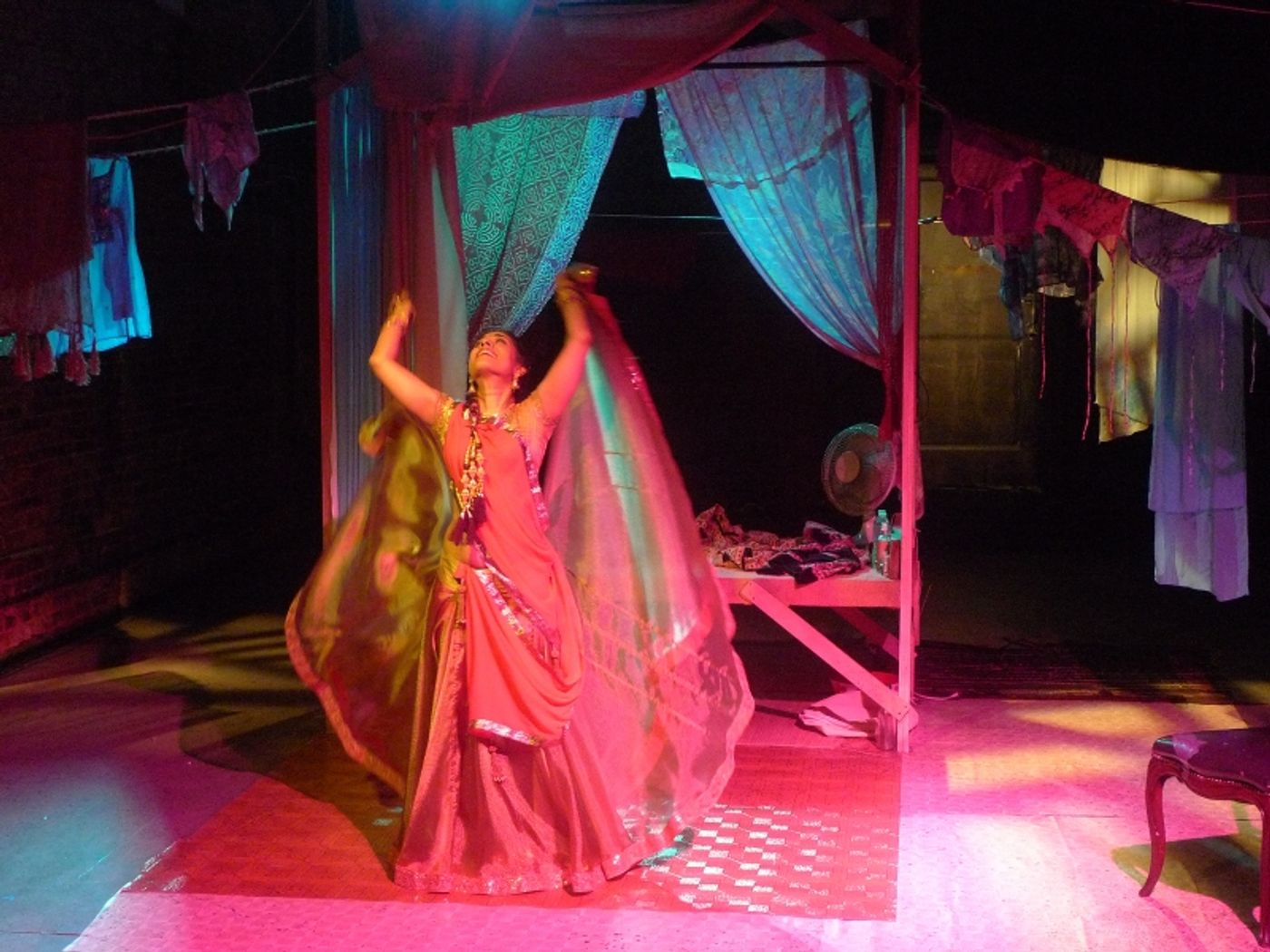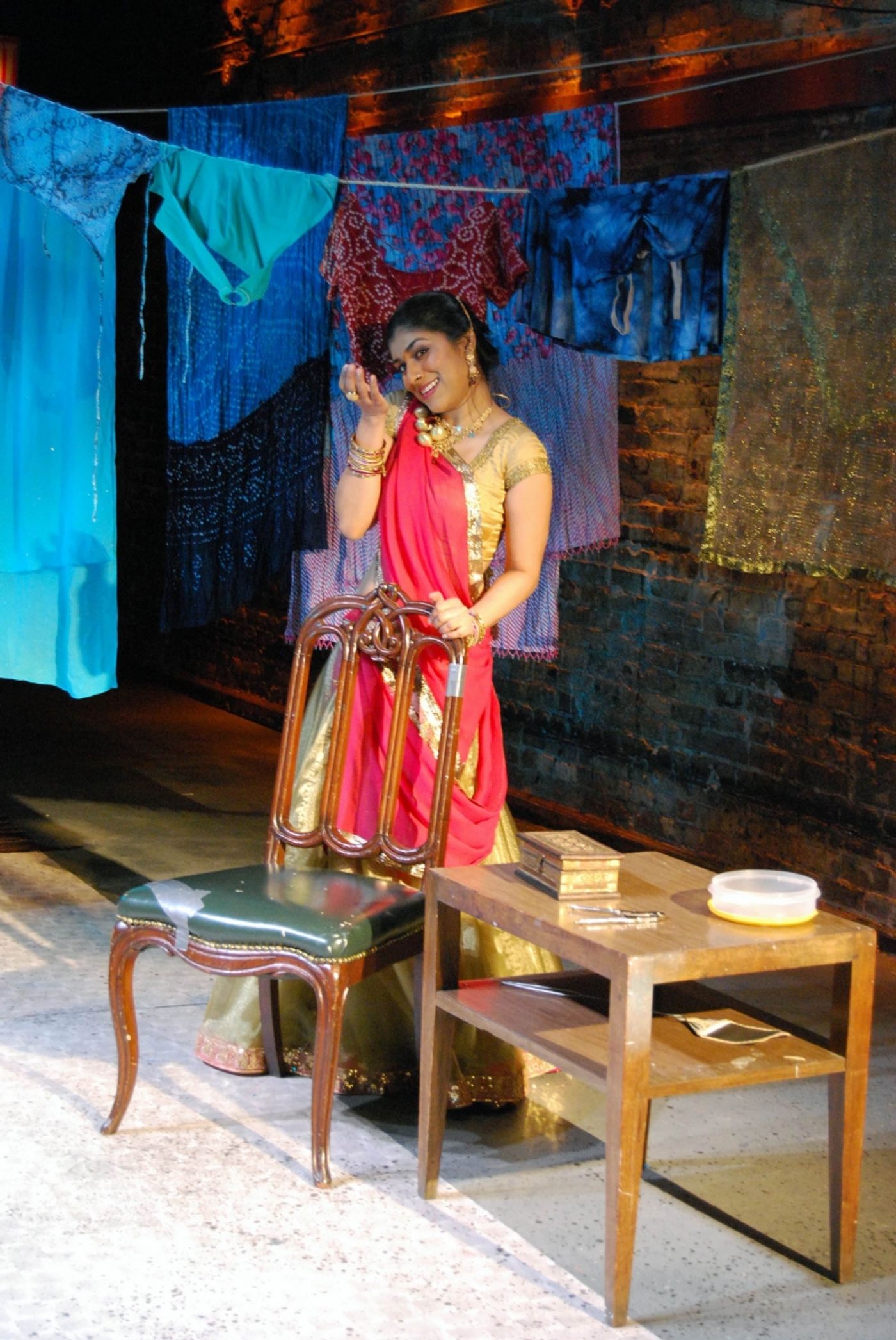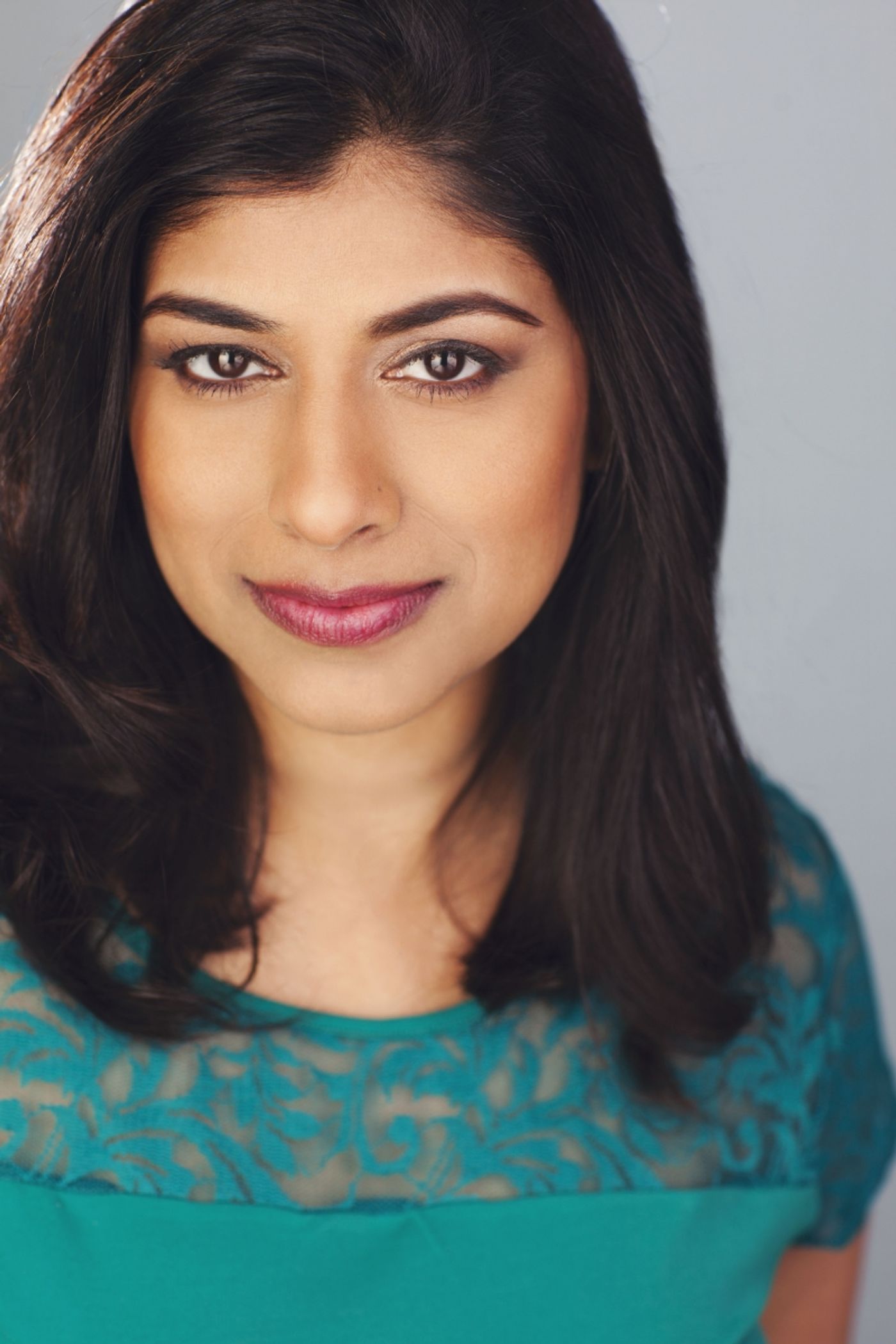Interview: Dipti Mehta of HONOUR: CONFESSIONS OF A MUMBAI COURTESAN on MarshStream's 'Solo Arts Heal' Series Has Amazing Stories to Tell
Women's History Month at the Marsh starts March 3rd with Mehta's vibrant and riveting work

Indian American actress and playwright Dipti Mehta's award-winning work, HONOUR: Confessions of a Mumbai Courtesan kicks off Women's History Month at The Marsh, which will focus the spotlight on female performers throughout the month of March. Offered via a MarshStream livestream, HONOUR incorporates original music, the dazzling colors of India, and a riveting plot worthy of Bollywood. Described as Memoirs of Geisha meets Slumdog Millionaire, it is a vibrant coming-of-age story set in the red-light districts of Mumbai. Centering on a mother-daughter duo, it examines inter-generational prostitution and why it exists, and addresses the issues of sex trafficking and human rights. This compelling work was named "Best Solo Show" at New York's FRINGE in 2016 and was hailed as "beautiful and devastating" in a five-star review by Time Out NYC. Following the performance, Dipti will join the Solo Arts Heal host to discuss raising awareness and how to make a difference in the community of sex workers. HONOUR: Confessions of a Mumbai Courtesan will be streamed at 7:30pm PST on Wednesday, March 3. For more information, visit www.themarsh.org/marshstream. The performance will also be archived and available to watch on demand via The Marsh's YouTube channel.
I recently spoke with Mehta while she was spending some time in Mumbai before heading back to her current home base in New York. To say that she has led an atypical life would be an understatement. An ardent feminist from a very young age in Mumbai, she became an actress and radio host while still in her teens before coming to America to get her doctorate in Molecular & Cellular Biology and work in cancer research at Sloan Kettering. In recent years, she has returned full-time to her true passion of theater, with a focus on telling stories we haven't heard before. In a wide-ranging conversation, we talked about the genesis of HONOUR, her unorthodox career path, and the current status of South Asian representation in the arts. The following has been condensed and edited for clarity.
HONOUR: Confessions of a Mumbai Courtesan sounds pretty intense and multi-layered. How would you describe the play?
Usually, I just give a one-liner that it's Slumdog Millionaire meets Memoirs of a Geisha meets Mahabharata. But it is really the story of a mother-daughter duo who happen to live in the red-light district. Instead of [others] looking at them as holistic human beings, they're defined by where they live and what they do for a living. HONOUR: Confessions of a Mumbai Courtesan is trying to break those stereotypes. We also meet characters who happen to be either living in the brothel or visiting it, and we get to see their truths as well. It's not like most solo shows that I have watched, memoir pieces where a character is coming out and telling their story. In HONOUR, the characters are actually living their lives and their stories get unveiled as the audience is watching the play. So it's kind of like a play, but in a solo show form.
The play is not autobiographical, so how is it that you came to tell this particular story?
To be very honest, it started off as a desire to keep working as an actor and be seen by the industry in New York. I used to live in Mumbai, and back in 2009 when I moved to the New York area I was thinking my career as an actor was just going to transition across the ocean, you know - but it didn't. Diversity was not even a conversation at the time, people weren't really inclusive, and I could only act in things they were casting for South Asian roles. So there wasn't work, and I noticed there were solo shows that people were doing, and I said "Why not take a stab at that?"
In the few years before that, every time I started to write, it tended to be about social issues around women, because I grew up in a very patriarchal, very orthodox community that believed in women being second-class citizens - that they must stay within their boundaries, they must be homemakers, they shouldn't be working - those kinds of beliefs. I've always been vocal about the practices that I thought were suppressive to women since I was a child. So it was natural for me to think about a story that would be about some kind of social justice issues around women's lives, and women in the sex industry are probably the most marginalized because they're not even given the status of human beings. I just wanted to tell a simple story of a mother and her daughter, and prostitution, and how society itself is playing a role in having this continue, generation after generation. Because once a child is born in the red-light district, or has a mother who's a prostitute, the girl's destiny is written in stone. And if it's a boy, then he'll most likely turn out to be a pimp or something. There are exceptions that prove the rule, but generally speaking, that's what happens. And even if they don't turn out to be that, they are very traumatized, they are facing the stigma.
I grew up in South Mumbai where there are like these pockets of red-light districts. You go through them, and you see these women, you see the children. I was always told these areas are not safe, you should not go there alone. And these women were "dirty." That was the adjective I heard as a child. So I was very curious - why are these women dirty? And then as a teenager when I learned why they were dirty, it was very intriguing to me why weren't the men paying for these women's services dirty? Why was it that women were bearing the brunt of the social anger? And the children that I saw there, I always wondered what happens to them. What do they do when they grow up? And the language I would hear in those areas was so raw, and at the same time I thought, "The children are still just children."
And so I wanted to write about them. I did just a small, little piece and wrote it from the perspective of an American journalist who comes to Calcutta. Cause I'd seen Born in Brothels and I was moved by that documentary. That was in the beginning, but then over the years the play kind of just found its own journey. It grew to three characters and now totals seven. Eventually it started to become a movement in its own way. I started to come across non-profits that wanted to collaborate or universities that wanted to have panel discussions or spread awareness around the issues of trafficking and the sex industry, and what women go through. So it came into a life of its own.

You've been advocating for women's rights since you were a child in Mumbai, which seems like a pretty gutsy thing to do. Did you get much pushback for that?
Omigod! [laughs] Yeah, it was quite a journey, quite a ride. I took the wrath of the family many, many times. I came to the U.S. to pursue further education and that was a big deal because I wasn't spoken for yet, wasn't engaged, no sort of possible betrothal. I applied to universities, studied for my GRE's, and got a full scholarship so I was like, "I'm coming to the U.S.!" My family was not happy about that decision. I had been an actor and a radio jockey, and those things also disturbed the social norms. My parents had to bear a lot of the brunt because people would tell them they failed to raise a normal child. [laughs] But I'm used to being a black sheep.
There has been much talk over the past year about the lack of representation in the arts, and as welcome as those discussions have been, it seems to me that Asian communities often still get left out of the conversation. Does it feel that way to you?
Omigod, yes! I definitely feel that way. South Asian folks are left out, even of the stories that are being told. I think the problem is really multi-level, even if the casting [director] is trying to find the right talent. It's not that they're trying to exclude us per se, but we haven't been there in this particular area [acting]. If you think about Indians, you usually think about IT or doctors and lawyers; you don't think about actors, you know? So I think the group of actors that is there is probably small, so casting directors probably have a real challenge in finding us.
But even when we are there, the conversation on diversity and inclusion is pretty new, and I think we're still being checked off as a box. So if in a festival or a theater season there's one show from a woman of color or a South Asian woman, they're not looking for other South Asian shows then because they feel inclusion has already been achieved. But it shouldn't be strictly about the ethnicity or the color of the skin; it should be about what kind of stories are we telling. Have these stories been told before, will these stories bring value to audiences? I think that conversation is still not happening when it comes to theater.
When it comes to film and TV also, I feel that the stories I want to see are still not being told. While in terms of auditions I do see more calls for South Asian actors than I saw 10 years ago, the stories are still white stories of brown people. They're the stories of second-generation or first-generation Indians who have now immigrated to the U.S. I still find that my story, somebody who moved from India to the U.S. in her teens or 20's and then created a life there, those stories are not being told. I think partly it is my own responsibility to share those stories - because writers will write the stories that they know. Right now, the writers getting the exposure are the South Asians who have been in the U.S. for a generation or two already. That's why their stories sound more American than South Asian to me.
But again, that brings in the problem of exposure. I have a play I wrote a couple of years ago and I'm grateful that I've had a few readings (of course the pandemic hit and nothing's moved much since then), but you know I don't have the exposure yet or platform to bring that story to life onstage. I have a couple of short films that I've written and I'm thinking of writing a screenplay. For now, it comes down to networking and contacts and all that.
But I feel like we are beginning the conversation so hopefully the future brings us all sorts of stories. I just think it should be about the story, about things in the narrative that we haven't heard before. And I think the South Asian diaspora has such amazing stories to tell. Our culture is beautiful, it is magnanimous and yet it is very complicated, it has its own issues. We are a global economy where I feel like South Asians do play a big role in pretty much every walk of life. So I think these stories deserve a platform. That's what I've got to say - a long answer to your short question. [laughs]
And as someone who was born in America, I will admit I don't really understand Indian culture because I don't get exposed to it very often.
And there's so much fitting in that has happened over the past few generations, you know like where parents are not even teaching their children their own native languages. I know this is happening for other cultures as well. I have Chinese friends who were not taught Mandarin because their parents wanted them to fit in. I know Indians who don't speak any [native] language because their parents thought it was more important for them [to assimilate]. So they took on the American lifestyle and they left out the Indian culture.
In addition to your theatre work, you have a number of film and TV credits. As an actor, do you still struggle to get seen for roles that aren't written specifically as South Asian?
Yes. I do have to be grateful to my team. They try their level best to submit me for any role that they find would be a fit for me. But yeah, the challenge is still there. I think it's also like the way any particular role is viewed. Most often I feel like producers and directors have sort of an idea of what that character looks like, and if they don't have much of an introduction with South Asians then they might not have a specific South Asian look in mind for that character. And once they're married to a certain look, they might go a little farther from that, but not too much. So I think that challenge definitely exists, but I'm really hopeful that all of that is starting to sort itself out.

I was fascinated to learn that you have a doctorate in Molecular and Cellular Biology, and worked as a researcher in prostate cancer at Memorial Sloan Kettering for 10 years. Why did you leave that career behind?
It was to pay the bills and it was in New York and I'm good at it and I enjoyed it, but it wasn't my passion. I used to be a radio jockey and I did lots of voiceovers and theater and things before I started my PhD. I wanted to do something more meaningful, something that would contribute to society, and as I started doing my PhD, very quickly I realized that I can make a bigger difference as an artist than I can as a scientist. And also being a lab rat didn't really fit into my personality at all. [laughs] So the idea was that I'll do it for a while until the play and the acting career take off. And I was enjoying the lab - my boss was really nice, the people were great and I had enough flexibility where I could still work on my show in the evenings and on weekends. I started touring I think in 2016, and at that time, I still had to only take a few days off, and I had good benefits at Sloan Kettering so it wasn't such a problem. It all was working out so I figured I can do both. And then when I couldn't do both [any longer]. I had to say goodbye to one of them, so I chose science to say goodbye to.
This past year has been difficult for everyone, but particularly for performing artists. Even given all that, what is currently giving you hope?
Well, it is definitely a difficult time, for artists in theater especially because I think filming has begun, but theaters I don't know when they will actually see the light of day (or the light of night?). I feel like theater is such an integral part of who we are as a society that I don't think it is going to die. I think it'll come back stronger. I have a lot of faith in theater makers and theater supporters, our audiences, and I feel like even though it will take a little longer, we will be stronger.
Every day I wake up and I think, "What can I do today to be creatively alive? What are the new stories that I want to tell?" I've been working on a new solo show, which is about a female Indian freedom fighter who played a key role in the freedom movement but wasn't given any credit, basically the name was wiped out from the history books. I've been researching her life and we did a 20-minute excerpt of that show in August.
So the hope comes from creating new work, and as challenging as it is, these opportunities also kind of feel like "OK, there is movement. We can tell stories even now." It just looks different right now, and hopefully we will go back to the dark theater with you know 100 people, 500 people watching us. And I think that nothing lasts forever... so the pandemic cannot last forever.
(All photos courtesy of Ms. Mehta)
Videos

